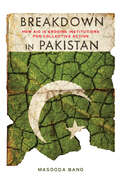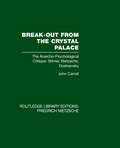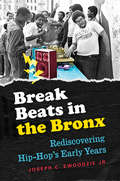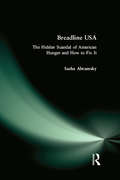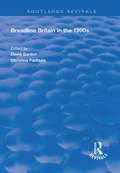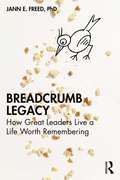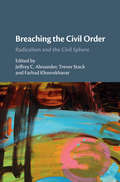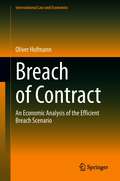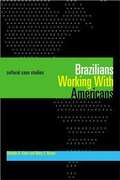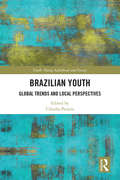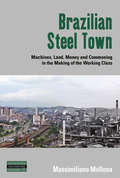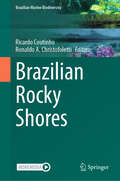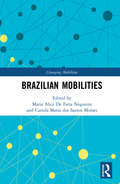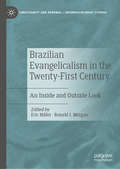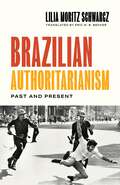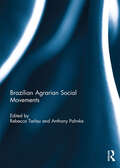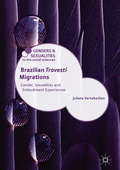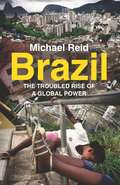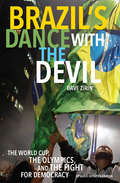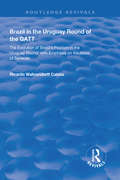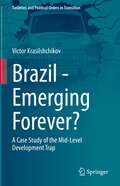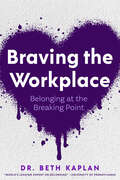- Table View
- List View
Breakfast with Tiffany: An Uncle's Memoir
by Edwin John WintleEd Wintle was a successful, urbane professional whose life, at forty, was very comfortable. He had reached the point when he looked around at his well-ordered, unfettered single existence and wondered: Is this all there is? After a desperate call from his sister at her wit's end, his street-wise thirteen-year-old niece Tiffany-a writhing ball of adolescent anger-comes to live with him. If he felt he needed a shot in the arm, what he got proved more like electroshock therapy.
Breakdown in Pakistan: How Aid Is Eroding Institutions for Collective Action
by Masooda BanoThirty percent of foreign development aid is channeled through NGOs or community-based organizations to improve service delivery to the poor, build social capital, and establish democracy in developing nations. However, growing evidence suggests that aid often erodes, rather than promotes, cooperation within developing nations. This book presents a rare, micro level account of the complex decision-making processes that bring individuals together to form collective-action platforms. It then examines why aid often breaks down the very institutions for collective action that it aims to promote. Breakdown in Pakistan identifies concrete measures to check the erosion of cooperation in foreign aid scenarios. Pakistan is one of the largest recipients of international development aid, and therefore the empirical details presented are particularly relevant for policy. The book's argument is equally applicable to a number of other developing countries, and has important implications for recent discussions within the field of economics.
Break-Out from the Crystal Palace: The Anarcho-Psychological Critique: Stirner, Nietzsche, Dostoevsky (Rouledge Library Editions: Friedrich Nietzsche)
by John CarrollBefore Marcuse and Laing, before Heidegger and Sartre, even before Freud, the way was prepared for the anarcho-psychological critique of economic man, of all codes of ideology or absolute morality, and of scientific habits of mind. First published in 1974, this title traces this philosophical tradition to its roots in the nineteenth century, to the figures of Stirner, Nietzsche and Dostoevsky, and to their psychological demolition of the two alternative axes of social theory and practice, a critique which today reads more pertinently than ever, and remains unanswered. To understand this critique is crucial for an age which has shown a mounting revulsion at the consequences of the Crystal Palace, symbol at once of technologico-industrial progress and its rationalist-scientist ideology, an age whose imaginative preoccupations have telescoped onto the individual, and whose interest has switched from the social realm to that of anarchic, inner, 'psychological man'.
Break Point: Two Minnesota Athletes and the Road to Title IX
by Sheri BrendenHow two teenage girls in Minnesota jump-started a revolution in high school athletics Peggy Brenden, a senior, played tennis. Toni St. Pierre, a junior, was a cross country runner and skier. All these two talented teenagers wanted was a chance to compete on their high school sports teams. But in Minnesota in 1972 the only way on the field with the boys ran through a federal court—so that was where the girls went. Break Point tells the story, for the first time, of how two teenagers took on the unequal system of high school athletics, setting a legal precedent for schools nationwide before the passage of Title IX.As Peggy&’s younger sister, author Sheri Brenden is uniquely positioned to convey the human drama of the case, the stakes, and the consequences for two young women facing the legal machinery of the state, in court and in school. In an account that begins with Peggy painstakingly typing her appeal to the Minnesota Civil Liberties Union and concludes with a long view of what Brenden v. Independent School District 742 set in motion, Sheri Brenden summons the salient details of this landmark case as it makes its way through the courts. Peggy and Toni, coaches, administrators, and experts testify before Judge Miles Lord, whose decision, upheld in a precedent-setting appeal, would change these girls&’ lives and open up athletic opportunities for innumerable others.Grounded in newspaper coverage, court records, and interviews, Brenden&’s deeply researched, scrupulously reported book is at heart the story of two talented teenage girls whose pluck and determination—and, often, heartache—led to a victory much greater than any high school championship.
Break Beats in the Bronx: Rediscovering Hip-Hop's Early Years
by Joseph C. EwoodzieThe origin story of hip-hop—one that involves Kool Herc DJing a house party on Sedgwick Avenue in the Bronx—has become received wisdom. But Joseph C. Ewoodzie Jr. argues that the full story remains to be told. In vibrant prose, he combines never-before-used archival material with searching questions about the symbolic boundaries that have divided our understanding of the music. In Break Beats in the Bronx, Ewoodzie portrays the creative process that brought about what we now know as hip-hop and shows that the art form was a result of serendipitous events, accidents, calculated successes, and failures that, almost magically, came together. In doing so, he questions the unexamined assumptions about hip-hop's beginnings, including why there are just four traditional elements—DJing, MCing, breaking, and graffiti writing—and not others, why the South Bronx and not any other borough or city is considered the cradle of the form, and which artists besides Kool Herc, Afrika Bambaataa, and Grandmaster Flash founded the genre. Ewoodzie answers these and many other questions about hip-hop's beginnings. Unearthing new evidence, he shows what occurred during the crucial but surprisingly underexamined years between 1975 and 1979 and argues that it was during this period that the internal logic and conventions of the scene were formed.
Breadwinning Daughters
by Katrina SrigleyAs one of the most difficult periods of the twentieth century, the Great Depression left few Canadians untouched. Using more than eighty interviews with women who lived and worked in Toronto in the 1930s, Breadwinning Daughters examines the consequences of these years for women in their homes and workplaces, and in the city's court rooms and dance halls.In this insightful account, Katrina Srigley argues that young women were central to the labour market and family economies of Depression-era Toronto. Oral histories give voice to women from a range of cultural and economic backgrounds, and challenge readers to consider how factors such as race, gender, class, and marital status shaped women's lives and influenced their job options, family arrangements, and leisure activities. Breadwinning Daughters brings to light previously forgotten and unstudied experiences and illustrates how women found various ways to negotiate the burdens and joys of the 1930s.
Breadline USA: The Hidden Scandal of American Hunger and How to Fix It
by Sasha AbramskyTwenty-five million Americans—nearly 9 percent of the U.S. population—rely on food pantries. Another 13 million aren’t linked to a food distribution network, and 14 million children are at risk of going hungry on any given day. Moreover, the faltering economy is increasing the number of American families that don’t know where their next meals are coming from.Breadline USA treats this crisis not only as matter of failed policies, but also as a portrait of real human suffering. Investigative reporter Sasha Abramsky focuses attention on the people behind the statistics—the families caught up in circumstances beyond their control. Breadline USA is a vivid reminder of the fate to which many more Americans may be subject without urgent action.
Breadline Britain in the 1990s (Routledge Revivals)
by David Gordon Christina PantazisFirst published in 1997, this series, published in association with the Social Policy Research Unity at the University of York, is designed to inform public debate about these policy areas and to make the details of important policy-related research more widely available.
Breadcrumb Legacy: How Great Leaders Live a Life Worth Remembering
by Jann E. FreedLegacy can seem far off and out of reach, but it doesn’t happen at journey’s end and it’s not only for the rich and famous. Legacy is now, and this book shows leaders how you can find and leave meaning on a daily basis. Jann E. Freed, PhD, introduces her Breadcrumb Legacy™ framework, a radical but pragmatic approach, made up of small actions you consciously take over time that accumulate into the trail, or legacy, you’ll leave behind. Breadcrumb Legacy is also a mindset, an awareness of the impact you’re having on your relationships, your organization, and your family, in every communication and interaction. This book is the guide to leaving a trail of meaning throughout your life and career. Based on in-depth interviews, Breadcrumb Legacy provides inspiration and practical stories for living a life worth remembering.
Breaching the Civil Order: Radicalism and the Civil Sphere
by Jeffrey C. Alexander Farhad Khosrokhavar Trevor StackIt is not only a paradox but something of an intellectual scandal that, in an era so shaken by radical actions and ideologies, social science has had nothing theoretically new to say about radicalism since the middle of the last century. Breaching the Civil Order fills this void. It argues that, rather than seeing radicalism in substantive terms - as violent or militant, communist or fascist - radicalism should be seen more broadly as any organized effort to breach the civil order. The theory is brilliantly made flesh in a series of case studies by leading European and American social scientists, from the destruction of property in the London race riots to the public militancy of Black Lives Matter in the US, the performative violence of the Irish IRA and the Mexican Zapatistas to the democratic upheavals of the Arab Spring, and from Islamic terrorism in France to Germany's right-wing populist Pegida.
Breach of Contract: An Economic Analysis of the Efficient Breach Scenario (International Law and Economics)
by Oliver Hofmann“Efficient breach” is one of the most discussed topics in the literature of law and economics. What remedy incentivizes the parties of a contract to perform contracts if and only if it is efficient? This book provides a new perception based on an in-depth analysis of the impact the market structure, asymmetry of information, and deviations from the rational choice model have, comprehensively. The author compares the two predominant remedies for breach of contract which have been adopted by most jurisdictions and also found access to international conventions like the Convention on Contracts for the International Sale of Goods (CiSG): Specific performance and expectation damages. The book illustrates the complexity such a comparison has under more realistic assumptions. The author shows that no simple answer is possible, but one needs to account for the circumstances. The comparison takes an economic approach to law applying game theory. The game-theoretic models are consistent throughout the entire book which makes it easy for the reader to understand what effects different assumptions about the market structure, the distribution of information, and deviations from the rational choice model have, and how they are intertwined.
Brazilians Working With Americans/Brasileiros que trabalham com americanos: Cultural Case Studies/Estudos de casos culturais
by Kelm Orlando R. Risner Mary E.Brazilians Working With Americans presents ten short case studies that effectively illustrate many of the cultural factors that come into play when North American business professionals work in Brazil. The authors summarize each case and the aspects of culture it involves, and American and Brazilian executives comment on the cultural differences highlighted by that case. A list of topics and questions for discussion also help draw out the lessons of each business situation. To make the book equally useful to Brazilians and Americans (whether businesspeople or language students), the entire text is presented in both English and Portuguese.
Brazilian Youth: Global Trends and Local Perspectives (Youth, Young Adulthood and Society)
by Cláudia PereiraThe collection brings together texts of Brazilian researchers who are dedicated to themes related to studies of youth cultures: sociabilities, subcultures, identities and belonging, pop culture, social movements, migration, consumption and materialities, generational exchanges, media representations and digital media, among others. The objective is to promote a broad dialogue that includes fields of knowledge such as Communication and Social Sciences, as well as local perspectives that represent the huge and rich diversity of the Brazilian regions. At the same time, the book proposes to discuss the reflexivity of such local youth cultures in the face of a global context that challenges, with ruptures and permanencies, the very idea of youth. The book seeks to fill the gap of a selection of scientific texts by Brazilian authors, about Brazilian youth cultures, aimed at foreign researchers.
Brazilian Steel Town: Machines, Land, Money and Commoning in the Making of the Working Class (Dislocations #27)
by Massimiliano MollonaVolta Redonda is a Brazilian steel town founded in the 1940s by dictator Getúlio Vargas on an ex-coffee valley as a powerful symbol of Brazilian modernization. The city’s economy, and consequently its citizen’s lives, revolves around the Companha Siderurgica Nacional (CSN), the biggest industrial complex in Latin America. Although the glory days of the CSN have long passed, the company still controls life in Volta Redonda today, creating as much dispossession as wealth for the community. Brazilian Steel-Town tells the story of the people tied to this ailing giant – of their fears, hopes, and everyday struggles.
Brazilian Rocky Shores (Brazilian Marine Biodiversity)
by Ricardo Coutinho Ronaldo A. ChristofolettiRocky shores correspond to a very particular habitat in Brazil, which is concentrated in the Southeastern and Southern coasts. There are different types of substrata and seascapes that cause a high environmental heterogeneity responsible to host a high species biodiversity and a range of ecosystem services. Primary and secondary production, as well as structuring organisms and processes, differs from temperate areas.
Brazilian Mobilities (Changing Mobilities)
by Maria Alice De Faria Nogueira Camila Maria Dos Santos MoraesBrazilian Mobilities presents an overview of the diversity of mobility studies developed in Brazil. It builds a picture of a strong Latin-American perspective emerging in the field of mobilities research, which provides unique insight into the complex dynamics of mobilities in the emerging countries from the Global South. Addressing such different areas as tourism, urbanization, media studies, social inequalities, marketing and mega-events, transport and technology, among others, the contributors use the new mobilities paradigm, or NMP (Sheller & Urry, 2006) as a starting point to reflect about the social changes experienced in the country and they also engage with newer literature on mobilities, including work done by Brazilian and Latin-American authors depending on the subject of each individual chapter. Illustrating to scholars the uniqueness and complexity of the Brazilian social-political and economic context, the book was organized in order to be a representative sample of the studies carried out in Brazil, as well as to contribute to other academic investigations on (im)mobilities and different social realities in emerging countries.
Brazilian Evangelicalism in the Twenty-First Century: An Inside and Outside Look (Christianity and Renewal - Interdisciplinary Studies)
by Eric Miller Ronald J. MorganOver the past fifty years Brazil’s evangelical community has increased from five to twenty-five percent of the population. This volume’s authors use statistical overview, historical narrative, personal anecdote, social-scientific analysis, and theological inquiry to map out this emerging landscape. The book’s thematic center pivots on the question of how Brazilian evangelicals are exerting their presence and effecting change in the public life of the nation. Rather than fixing its focus on the interior life of Brazilian evangelicals and their congregations, the book’s attention is directed toward social expression: the ways in which Brazilian evangelicals are present and active in the common life of the nation.
Brazilian Authoritarianism: Past and Present
by Lilia Moritz SchwarczHow Brazil’s long history of racism and authoritarian politics has led to the country’s present crises and epidemic of violenceBrazil has long nurtured a cherished national myth, one of a tolerant, peaceful, and racially harmonious society. A closer look at the nation's heritage, however, reveals a far more troubling story. In Brazilian Authoritarianism, esteemed anthropologist and historian Lilia Schwarcz presents a provocative and panoramic overview of Brazilian culture and history to demonstrate how the nation has always been staunchly authoritarian. It has papered over centuries of racially motivated cruelty and exploitation—sources of the structural oppression experienced today by its Black and Indigenous population. Linking the country’s violent past to its dire present, Schwarcz shows why the social democratic left was defeated and how Jair Bolsonaro ascended to the presidency.Schwarcz travels through five hundred years of colonial history to consider Brazil’s allegiance to slavery, which made it the last country to abolish the system. She delves into eight elements that pervade Brazil’s problematic culture: racism, bossism, patrimonialism, corruption, inequality, violence, gender issues, and intolerance. But Schwarcz also argues that Brazil’s future is not absolutely hopeless. History is not destiny, and even as the nation experiences its worst crises ever—social, political, moral, and environmental—it has the potential to overcome them.A stark, revealing investigation into Brazil’s difficult roots, Brazilian Authoritarianism shines a light on how the country might imagine a more hopeful path forward.
Brazilian Agrarian Social Movements
by Rebecca Tarlau and Anthony PahnkeContradictions between impressive levels of economic growth and the persistence of poverty and inequality are perhaps nowhere more evident than in rural Brazil. While Brazil might appear to be an example of the potential harmony between large-scale, export-oriented agribusiness and small-scale family farming, high levels of rural resistance contradict this vision. In this volume, individual contributions from a variety of researchers across the field highlight seven key characteristics of contemporary Brazilian resistance that have broader resonance in the region and beyond: the growth of international networks, the changing structure of state–society collaboration, the deepening of territorial claims, the importance of autonomy, the development of alternative economies, continued opposition to dispossession, and struggles over the meaning of nature. By analyzing rural mobilization in Brazil, this collection offers a range of insights relevant to rural contention globally. Each contribution in this title increases our understanding of alternative agricultural production, large-scale development projects, education, race and political parties in the contemporary agrarian context. This book was previously published as a special issue of the Journal of Peasant Studies.
Brazilian 'Travesti' Migrations: Gender, Sexualities And Embodiment Experiences (Genders and Sexualities in the Social Sciences)
by Julieta VartabedianThis book sheds new light on the interconnections between identity, gender and geographical displacement. At its centre are Brazilian travesti migrants, assigned as male at birth but later seeking to convey the aesthetic attributes of women by repeatedly performing a minutely-studied type of femininity. Despite the fact that they have been migrating between Brazil and Europe for more than forty years, very little is know about them, especially in the English-speaking world. This work therefore fills a significant lacuna in our understandings of sexualities, bodies and trans issues, whilst rejecting hegemonic terms such as 'transsexual' and 'transgender' in favour of the specificity of the travesti. What it presents is an ethnographical study of their bodily and geographic-spatial migrations, analysing how they become travestis through the gendered modification of their bodies, their involvement in sex work, and the transnational migrations to Europe that many of them make. Examining their lives in both Brazil and Europe, it also analyses how their migrations influence the construction of their subjectivities. Drawing on extensive fieldwork in Brazil and Barcelona, this exciting book will appeal to all those interested in gender, sexuality and transgender issues.
Brazil: The Troubled Rise of a Global Power
by Michael ReidExperts believe that Brazil, the world's fifth largest country and its seventh largest economy, will be one of the most important global powers by the year 2030. Yet far more attention has been paid to the other rising behemoths Russia, India, and China. Often ignored and underappreciated, Brazil, according to renowned, award-winning journalist Michael Reid, has finally begun to live up to its potential, but faces important challenges before it becomes a nation of substantial global significance. After decades of military rule, the fourth most populous democracy enjoyed effective reformist leadership that tamed inflation, opened the country up to trade, and addressed poverty and other social issues, enabling Brazil to become more of an essential participant in global affairs. But as it prepares to host the 2014 soccer World Cup and 2016 Olympics, Brazil has been rocked by mass protest. This insightful volume considers the nation's still abundant problems--an inefficient state, widespread corruption, dysfunctional politics, and violent crime in its cities--alongside its achievements to provide a fully rounded portrait of a vibrant country about to take a commanding position on the world stage.
Brazil's Dance with the Devil: The World Cup, The Olympics, and the Struggle for Democracy
by Dave Zirin<P>The people of Brazil celebrated when it was announced that they were hosting the twentieth World Cup (June 12-July 13, 2014), the world's most-viewed sporting tournament, and the thirty-first Summer Olympics (August 5-21, 2016). <P>Now they are protesting in numbers the country hasn't seen in decades, with Brazilians taking to the streets to try to reclaim the sports they love but see being corrupted by powerful corporate interests, profiteering, and greed. <P>In this compelling new book, relying on original reporting from the most dangerous corners of Rio to the halls of power in Washington, DC, Dave Zirin examines how sports and politics are colliding in remarkable fashion in Brazil, opening up an international conversation on the culture, economics, and politics of sports.
Brazil in the Uruguay Round of the GATT: The Evolution of Brazil's Position in the Uruguay Round, with Emphasis on the Issue of Services (Routledge Revivals)
by Ricardo Wahrendorff CaldasFirst published in 1998, this volume analyses Brazil’s strategy in the Uruguay Round, focusing on the issue of services. Three different moments were chosen for analysis. The first was during discussions before the launch of the Uruguay Round. During this period, Brazil led the Less Developed Countries (LDCs), in obstructing the inclusion of services on the agenda. The Second was during the launch of the Uruguay Round, when Brazil persisted with this policy. This second period is referred to as the initial position of Brazil in the Uruguay Round. The third was Montreal, in 1988, when Brazil supported the principles which guided an agreement on services. After this turning point, Brazil’s position in the Round was increasingly supportive of an agreement, not only in services, but in all fields.
Brazil - Emerging Forever?: A Case Study of the Mid-Level Development Trap (Societies and Political Orders in Transition)
by Victor KrasilshchikovThis book discusses the social and economic problems currently faced by Brazil as one of the largest “emerging countries”. It examines the prospects of Brazilian development from an interdisciplinary perspective, and studies both socio-economic and political variables. The book embraces the large period of Brazil's development in the 20th and the first decades of the 21st Century. The peculiar attention is drawn to the short period of prosperity under the left-centrist governments as a continuation of the previous conservative modernisation model, which produced an increased dependency on China and a premature deindustrialisation of the economy. Assessing Brazilian statistics on households’ incomes and consumption, the book subsequently discusses the lack of strong social actors as the main problem in today’s Brazil. In closing, it examines probable scenarios for the country’s development and compares the situation to other “emerging countries”, including the Asian giants, China and India. The book addresses the needs of researchers in the fields of political science, economics and sociology who are seeking a better understanding of emerging countries, and the Brazilian case in particular.
Braving the Workplace: Belonging at the Breaking Point
by Beth KaplanDr. Beth Kaplan offers a lifeline for personal and professional fulfillment with Braving the Workplace!Practical steps for transformation. Dr. Beth Kaplan shares her expertise on belonging in the workplace while sharing insights on this vital element in a rapidly changing corporate landscape. Braving the Workplace combines groundbreaking research with engaging storytelling to offer a comprehensive guide for businesses. Dr. Kaplan provides a clear, actionable framework to help organizations cultivate a sense of belonging among their employees while promoting mental health. Belonging and the workplace. This book is valuable for many readers, from individuals grappling with personal belonging issues to senior leaders tackling leadership challenges and driving inclusivity. It provides strategies to effectively assume leadership roles, create a diverse work environment, and boost employee productivity. Braving the Workplace is a must-read for making belonging a fundamental aspect of any organization. Inside, you will find: A step-by-step guide on how to take action and create change for a diverse work environment Strategies for personal growth in finding a sense of belonging in the workplace Techniques for having inclusive conversations to foster a positive work environment If you enjoy books on work culture, such as Belonging, Inclusion on Purpose, or You Belong Here, then Braving the Workplace is for you!

